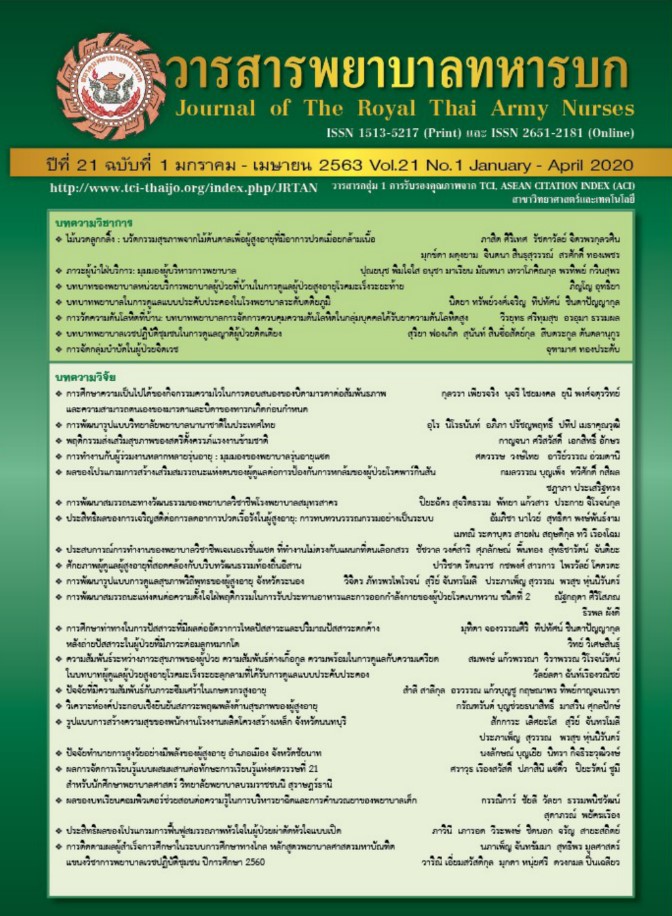Development of A Buddhist Health Care Model for The Elderly in Ranong Province
Keywords:
Buddhist Health Care Model, Knowledge About Self-Care, Health Practice, Social SupportAbstract
Research and development on Development of a buddhist health care model for the elderly in Ranong Province aims to 1) study the situation analysis Problems of elderly health care, Buddhist way of life 2) Study and create activity plans and test activity plans Elderly health care, Buddhist way 3) Comparison of the development of elderly health care and Buddhist ways before and after the experiment The application of applying the Buddhist principles in regard to The Threefold Training and The Noble Eightfold Path. The focus of the model was also on the practice relating to 3 aspects (food, exercise, and emotion) and 3 Ss (pray,meditation and Dharma discussion). The elderly, social groups, aged 60 years and over, number 45, collected data using questionnaires. Statistics used in data analysis were percentage, mean, standard deviation and comparison of results within the experimental group using Paired samples t - test.
The research results showed that the model developed is appropriate and relevant with the community’s needs. It also helps to propel more activities in accordance with the Buddhist health care model in the community. After the pretesting of the activity plan developed, it was found that the sample &, had significantly higher levels of knowledge, practices and receiving of social support than before the experimentation (p < .05: knowledge = 25.11 compared to
= 19.95 ; practices
= 2.78 compared to
= 2.28. ; receiving social support
= 3.57 compared to
= 2.79).
Downloads
References
2. National Statistical Office. Thai elderly. View/echo from statistical data. Bangkok: PA Living; 2008. (in Thai)
3. Bureau of Policy and Strategy, Ministry of Public Health. Strategic plan and action plan for the fiscal year 2006-2009, under the national strategy, join forces to create health for Thai people, strong, strong in Thailand. Nonthaburi: Ministry of Public Health; 2005. (in Thai)
4. Ranong Provincial Public Health Office Health population data; 2018 (in Thai)
5. Paphassorn Kimsuwanwong. Holistic health care of the elderly according to the Buddhist concept. B.E., M.Ed. (Educational Psychology), Ph.D. (Buddhism). Buddhist teachers: Mahachulalongkornrajavidyalaya University, Khon Kaen Campus; 2013. (in Thai)
6. Pienodwong C, Mahaweerawat U and Sota C. The development of the elderly health management in Khanthanrat Sub-district, Kantharawichai District, Maha Sarakham Province. Journal of Health System Research and Development. 2012; 4(3): 1-11. (in Thai)
7. Athikanon N. Effects of health promotion program for the elderly in the elderly club, Bang Pahan District, Phranakhonsiayutthaya Province. (Master of Public Health Thesis) Burapha University; 2011. (in Thai)
8. Chantakueangbon K. Development of exercise promotion model for the elderly in the district Kantharawichai, Mahasarakham Province. Thesis, M.Sc. (Health System Management), Mahasarakham University;2008. (in Thai)
9. Kimsuwanwong P. Holistic health care of the elderly according to the Buddhist concept. B.E., Prof. (Educational Psychology), Ph.D. (Buddhism). Teacher of Buddhism : Mahachulalongkornrajavidyalaya University, Khon Kaen Campus.; 2013. (in Thai)
10. Suthanon T. The application of the principles of buddhism in the happy life of the elderly. Master’s degree thesis, Master of arts program in buddhism, Graduate school: Mahachulalongkornrajavidyalaya University; 2013. (in Thai)
11. Thachart S. Elderly Care, Buddhist Way: Case Study of Elderly Home Watpa Nongsaeng Udon Thani Province. Department of Culture Science
Mahasarakham University; 2008. (in Thai)
12. Artsanthia J, Pomthong R. The trend of elderly care in 21 century: challenging in nursing care. Journal of The Royal Thai Army Nurse 2018;19 (1): 39-46. (in Thai)
13. Phadungyam M, C.Duvall A. Rehabilitation strategies for resilience quotient in the elderly. Journal of The Royal Thai Army Nurse 2018; 19 (1): 66-73. (in Thai)
Downloads
Published
How to Cite
Issue
Section
License
บทความหรือข้อคิดเห็นใดใดที่ปรากฏในวารสารพยาบาลทหารบกเป็นวรรณกรรมของผู้เขียน ซึ่งบรรณาธิการหรือสมาคมพยาบาลทหารบก ไม่จำเป็นต้องเห็นด้วย
บทความที่ได้รับการตีพิมพ์เป็นลิขสิทธิ์ของวารสารพยาบาลทหารบก
The ideas and opinions expressed in the Journal of The Royal Thai Army Nurses are those of the authors and not necessarily those
of the editor or Royal Thai Army Nurses Association.






